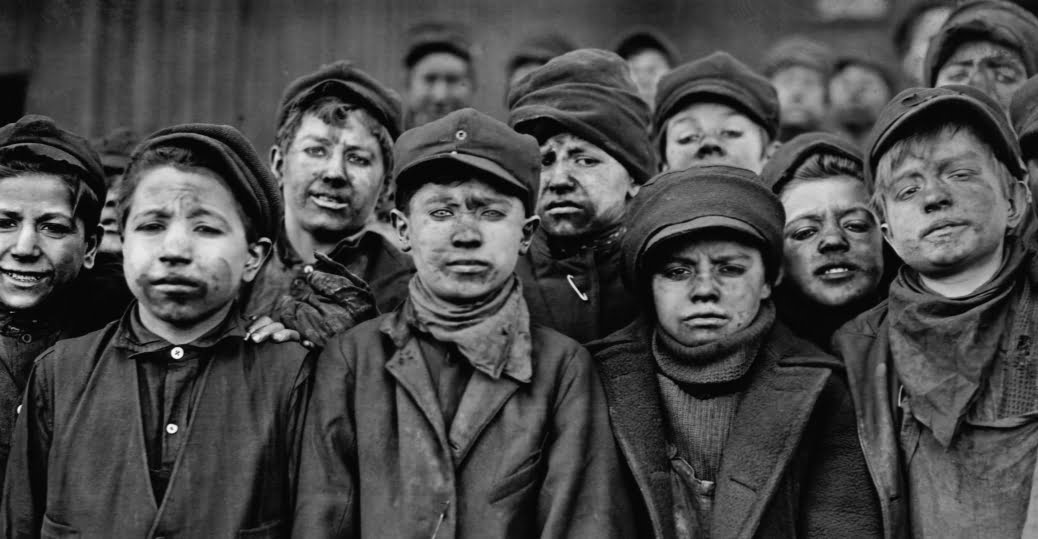In the headlines:
“10-Year-Olds Found Working Late Nights at Kentucky Fast-Food Operator”; “National Franchise Found Guilty of Employing Underage Workers, and fined $212,500”; “Pennsylvania Roofing Contractor Faces Criminal Charges for Employing 12 to 15 Year Old Workers in Hazardous Work”; and “Company Fined $1.5 Million for Hiring Children to Clean Meatpacking Plants.”
Were these stories ripped from the 1890s, the era of the robber barons? Were they the sources used by the famed muckraker Upton Sinclair in his ground-breaking 1906 expose of the meatpacking industry, The Jungle?
Not by a long shot. They were breaking news in 2023. And the recent push at the state level to loosen child labor regulations is seen as part of a coordinated assault on not just workers’ wages but on schools and other public institutions as well as on the whole concept of equality in American society.
READ: The Role Of Real Estate In The For-Profit Charter School Grift
In 1870, according to Virginia Commonwealth University’s Social Welfare History Project, the first U.S. Census to report child labor numbers counted 750,000 children under the age of 15, working for employers. By 1911, that number had ballooned to more than two million children, many of them working more than twelve hours a day and six days a week for minuscule wages, often in dangerous conditions.
When the number of child laborers peaked in 1900 to one in five, according to the U.S. Bureau of Labor Statistics, only 11 percent of children between fourteen and seventeen were in public schools, with fewer graduating.
As more and more states passed compulsory education laws and the Federal Labor Standards Act of 1938—which outlawed most, but not all, forms of child labor—went into effect, the impact in both sectors was unmistakable. The percentage of eligible students in secondary and middle schools rose while the number of children under fifteen working full-time hours fell.
Despite the recent rise in the number of companies found guilty of violating current child labor laws, that has not stopped ten states, mostly red, from passing laws loosening those regulations. How might these laws impact public education? Some recent studies show they could potentially have a devastating impact on both graduation rates and attendance.
A 2010 National Institutes of Health study found that students who worked more than twenty hours a week or more performed worse in school than those who worked less. A more recent 2020 study found that teenagers who spent long hours on the job were more likely to drop out of high school.
Some of the same organizations and advocates that are pressing to relax child labor laws, also support efforts to undermine public schools.
When Betsy DeVos was nominated in 2017 to be Trump’s Secretary of Education, her main claim to fame was her advocacy of private schools vouchers and the hollowing out of public education. Lesser known at the time was the fact that a think tank funded by DeVos and her husband promoted relaxing child labor regulations.
The think tank, called the Foundation for Government Accountability, has been in the thick of efforts to loosen child labor laws on the state level. Its CEO, Tarren Bragdon, also came out in favor of “education saving account” legislation that would undermine public schools in Florida.
Americans for Prosperity, “part of a network of 501(c)(4) dark money groups linked to Charles and David Koch,” according to OpenSecrets, has been a strong advocate of both private school vouchers and the weakening of child labor regulations.
“I don’t think it is a coincidence at all that the same groups that we are seeing attempt to roll back child labor laws are also the same groups that are part of this relentless attack on public education and, more broadly, public institutions,” Nina Mast, a state economic analyst with the Economic Policy Institute, tells The Progressive. “These goals are part of the rightwing agenda that’s attempting to dismantle policies in place to regulate labor, institutions in place to serve the public and educate our children.”
Mast also felt it was no coincidence that in just a few weeks after Arkansas relaxed their state child labor regulations that state Governor Sarah Huckabee Sanders also signed a private school voucher bill into law.
Advocates of undoing child labor regulations have mainly justified it on two grounds: One is that there is a huge labor shortage in the United States, and companies are struggling to get help; the second is that parents should be making decisions on whether their kids work, not schools or other bureaucracies.
In an interview with The Progressive, Reid Maki, a coordinator with the Child Labor Coalition, a nonprofit group against child labor, addressed the first point. “You can’t balance a labor shortage on the backs of teen workers,” Maki says, “especially if it impacts their education negatively, if it puts them at risk for injury.” He added that increasing wages would be a better way to attract adult workers and end the labor shortage.
Maki also commented on how cynical it was of some state legislatures to loosen child labor laws while at the same time exempting employers from any legal liability should the youth they employ become injured or killed on the job.
As to the second point, Mast adds, “Despite invoking parents’ rights in Arkansas, that bill actually removes the requirement of proof of parental permission, and now youth can be employed without their parents being informed.”
For citizens concerned about the increasing number of states loosening child labor rules, Maki had the following advice.
READ: Republicans Want To Defund Our Libraries
“It is really important to make a lot of noise and to oppose these efforts in a variety of ways,” he says. “Sign online petitions, make your voice heard, call up your state legislators.”
He also recommended supporting federal legislation to raise the minimum working age for child farmworkers. The bill, known as the Children’s Act for Responsible Employment and Farm Safety 2022 (CARE Act), was introduced into the U.S. House of Representatives in March 2022 and currently has the support of more than 200 national, regional, and state-based groups.
Mast asserted that strong public opposition stopped deregulation bills in several states. In Virginia, she says, a subminimum wage bill for youth failed due to a public backlash.
But she was under no illusions about the ultimate goal of those advocating for looser child labor laws: “It is about taking us back to the time of economic opportunity for the few and exploitation for everyone else.”
This article was originally published in The Progressive and reprinted here with permission.






